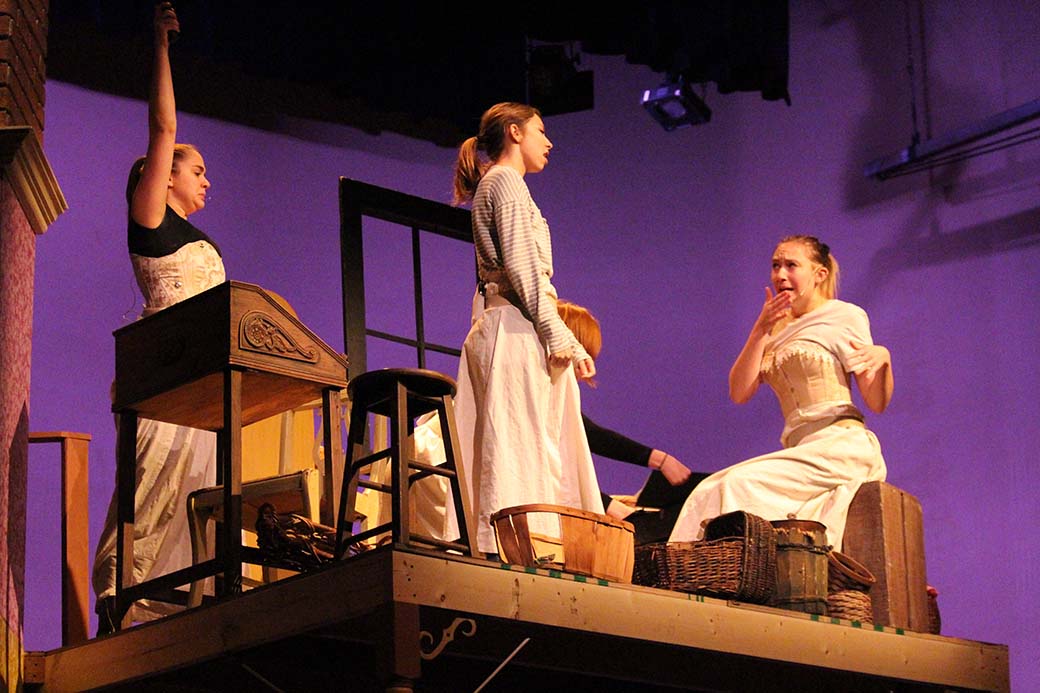
USD production of ‘Little Women’ explores feminism, expands opportunities for actresses
Though the novel “Little Women” was written more than 150 years ago, many members of the USD community believe its themes are still relevant today.
“It is a coming of age story for a young woman who is finding herself,” Jackson Whitaker, a sophomore musical theater major, said. “No matter what generation, it’s still applicable. Jo March is very much a strong female character, and I think that in today’s world it’s obviously something that is needed.”
The novel was written by Louisa May Alcott and has strong themes of feminism.
“We don’t live for society, we live for what’s inside of us. We live to expand our minds and engage in passionate exchanges.”
This line from Jo March, the lead role in “Little Women,” encompasses the play’s feminist theme.
USD’s production of “Little Women” will run for two weekends: Nov. 17, 18 and 19 and then again on Nov. 29, 30 and Dec. 1 and 2. Evening shows begin at 7:30 p.m. and Sunday matinee starts at 2 p.m.
“Little Women” is a semi-autobiographical story of Alcott’s life. The play and novel follow the life of the four March sisters, mainly focused on the second oldest daughter, Jo, and her struggle to defy societal norms.
“These four girls are at different stages growing up,” said director Matt Nesmith. “The oldest one is on the verge of getting married, one wants to be in society and Jo is the protagonist. (She) is a very strong independent woman, which is what resonates so nicely today even though it was written 150 years ago.”
USD’s twist
The theater department is heavy with female actresses, with three of the main characters double casted: Jo, Marmee and Amy. The first weekend will have one cast and the next weekend will have a different cast.
“The reason for that is to give more of our female actresses the opportunity to do lead roles, but also to provide a different experience for our audience,” Nesmith said. “So you get to see the same show, but with different takes on these characters, which is really exciting and fresh for audiences.”
Gloria Kelly, a junior musical theater major, will be playing Marmee for the first weekend of the“Little Women.”
“It has been a very interesting and fun experience,” Kelly said. “Rachel Smith (the other Marmee) and I bring very different elements to the table and it has been amazing to see the differences between the families when the other actors step in. Being double cast is something that I am definitely interested in doing again.”
Alyssa Collett, a sophomore musical theater major, will be playing Jo in the first weekend of “Little Women.”
Collett said double casting has been a good experience for her.
“It’s really fun,” Collett said. “You would think there’d be competition, like, ‘Oh this cast is better than that,’ but it’s really nice. Even when you’re not on stage and you’re watching the other cast do it, you are still learning new things. Lauren (Stacks) will do something and I’ll be like, ‘Oh my gosh, I never thought of taking it that way.’ So it just sparks new ideas.”
The USD theater department will be preforming “Little Women” as a musical.
“Being in the musical adaptation of ‘Little Women’ has been incredible,” Kelly said. “The music and score is stunning and can easily inspire or pull at the heartstrings. There are some really fun numbers with dancing, laughter and joy, and there are others that will make you weep in seconds.”
Early feminist
Jo spends the majority of the play trying to become a successful writer, but is rejected 22 times before she’s accepted. Senior musical theater major Lauren Stacks, who plays the role of Jo, said the character is an example of an early feminist.
“I am also a passionate feminist,” Stacks said. “You would think it’s innate as a woman to want equal rights, but as you see these inequalities and deficiencies in our society, it’s like I want to fight for this. (Although) Jo is a fictional character set in the late 1800s, she is me. I relate so closely to this character, and it’s amazing.”
Stacks said Jo’s manuscripts are rejected in the play because the things she writes about are too vulgar for a woman to write about.
“Jo has a very different, very transcendental point of view,” Stacks said. “She wants to change the world, she wants to change society’s view on women.”
Stacks said she believes “Little Women” is relevant because women still face oppression in today’s society.
“These days, a lot of women are largely restricted on what they decide to do with their bodies,” Stacks said. “There are certain careers that are viewed as feminine, there’s colors and fashions that are viewed as feminine. Jo is really trying to break that early glass ceiling.”
Although the play mainly follows Jo’s struggles of becoming a professional writer, the play also has a strong sense of family. While she’s trying to become an author, she’s faced with family crises and trying to cope with death of a family member.
“Even though we are tracking her desire to be an independent woman and become a professional writer, it is really more of a story on family,” Nesmith said. “What she realizes in the end, even though she goes away to try and become a writer, is that when she comes back home (is when she really) finds where she is meant to be. It is a story of coming full circle.”


